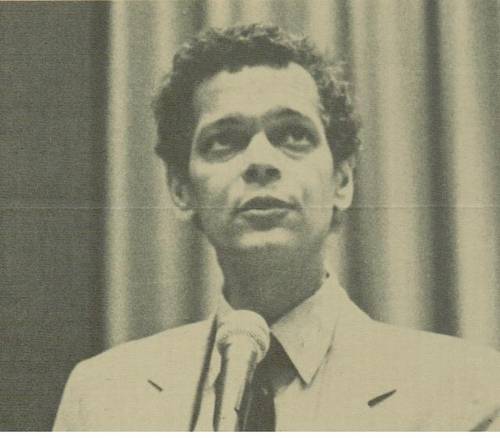Featured Text
The following text is excerpted from No Easy Victories for web presentation on allAfrica.com and noeasyvictories.org. This text may be freely
reproduced if credit is given to No Easy Victories. Please mention that the book is available
from http://noeasyvictories.org and
http://africaworldpressbooks.com.
Public Investment and South Africa
Julian Bond

At the first national Conference on
Public Investment and South Africa in
1981, some 200 state and municipal
legislators from across the United
States attended workshops on drafting
socially responsible legislation,
among other topics. Held in New York
City on June 12–13, the conference
also drew trade unionists, investment
experts, church leaders, academics, and
grassroots organizers. The conference
sponsors included ACOA, AFSC, the
Connecticut Anti-Apartheid Committee,
Clergy and Laity Concerned,
the Interfaith Center on Corporate
Responsibility, TransAfrica, the United
Methodist Office for the U.N., and the
Washington Office on Africa.
For the opening session at the United
Nations, Ambassador B. Akporode Clark
of Nigeria, then chair of the U.N. Special
Committee Against Apartheid, welcomed
the participants. The keynote
address, excerpted here, was given by
SNCC veteran and Georgia state senator
Julian Bond.
State legislator Julian Bond in 1981. Photo courtesy of Richard Knight.
Thank you a great deal for the kind and warm welcome. I think
most of us who work on African issues, who are scattered throughout
the United States, begin to develop a feeling of isolation and
estrangement. So it is extremely gratifying to discover that we are
many and diverse, that those of us represented here in fact are representatives
of a larger group of people scattered throughout the 50 states of the
U.S. and that our cause is just and our success virtually assured.
Among all of us who are gathered here, there is a particular group:
legislators and council members, who are here as part of the responsibility
of our offices because we are all sworn to uphold the public good. There
certainly could be no greater good than the cause for which we gather, the
advancement of the struggle for the independence of Southern Africa.
We are here to complete the process of halting American complicity
in the most hideous government on the face of the planet, the one system
where racial superiority is constitutionally enshrined. We gather here at
a time when even the most moderate advances away from complicity are
being compromised, abandoned and withdrawn.
In less than six months, the new government of the U.S. reversed even
the halting Africa policies of the Carter administration and has embarked
on a course of arrogant intervention into African affairs in the most hostile
way. From Cape Town to Cairo, the American eagle has begun to bare his
talons. Our secretary of state is a man who pounded his palms on the table
like tom-toms when African affairs were discussed in the Nixon White
House. Our new ambassador to the U.N. sees callers [a high-ranking South
African military intelligence team that came March 15, 1981]. [First] she
says she does not know [them] and then denies seeing them at all. When
her visitors are discovered to have entered the U.S. illegally and their hospitality
revealed to be a violation of policy, she dismisses all complaints as
if the policy had been already revised.
Unfortunately, she was right. America’s policies towards Africa have
changed. They have changed from benign neglect to a kind of malignant
aggression. In Mozambique, starvation is added to the American arsenal.
On the high seas, the American oil companies, Mobil, Exxon, and Texaco
have joined European interests in breaking the OPEC embargo to South
Africa. On Capitol Hill there is the intensity of Soviet competition in
Africa, not humanitarian concerns, which conditions American aid to the
continent. Mineral rights are exchanged for human rights.
In South Africa itself there is no mistaking the increased militancy,
each group adding momentum to the irresistible motion of liberation.
But our concerns are here. Our cause is to take whatever action we can
to end American complicity with this international problem [apartheid].
Our contribution is to pull together those forces—legislators, investment
experts, trade unionists, student activists, that growing constituency for
freedom in South Africa—to facilitate the expansion of public prohibitions
against the expenditure of public funds for inhuman purposes. In
short, we intend to end American investment in evil. The evil, of course, is
the system of apartheid in which four and a half million whites absolutely
dominate 20 million nonwhites, denying them every vestige of humanity.
As the second-largest foreign investor, the U.S. plays a key role in keeping
apartheid afloat. The net effect of American investments, according to
former senator Dick Clark of Iowa, has been to strengthen the economic
and military self-sufficiency of South Africa’s apartheid regime.
Our cause, then, is to end American complicity with this evil. But we
must know the course of the rapidly shifting climate around us. The loudest
voice on the Senate Foreign Relations Committee today belongs to Senator
Jesse Helms, Republican of North Carolina and apologist for South Africa’s
fascists. The new president of the U.S. had already announced even before
his nomination and election his intentions to subsidize subversion in
Angola; he has sent repeated assurances to South Africa’s white population
that the U.S. will tolerate their genocide. He has further delayed the liberation
of Namibia, rewarding South Africa’s intransigence. He has made the
American colossus he professes to adore bow down before a small tribe of
racist tyrants.
We are here, then, to force the disengagement of our commonly held
wealth from this evil. I think we all realize that this will be a difficult and
time-consuming process, for we are in effect opposing the whole of American
history. The current condition of American black people, political
and economic, is more than well known. We gather here to ask the U.S. to
honor the principle that no person’s worth is superior to another, to do in
foreign affairs what is yet to be done at home.
If it is difficult, our task is not impossible. Events in South Africa daily
demonstrate that we are a part of a quickening struggle whose outcome
has never been in serious doubt. We can make a great contribution to that
struggle if all who truly believe in freedom will join us. Ours, then, is a
subtle request; to ask our neighbors, the people with whom we share the
country, to refuse to finance the domination of one set of human beings by
another.
Surely that is a reasonable appeal. South Africa today constitutes a
direct personal threat to us all. Forty years ago, Adolf Hitler demonstrated
that genocide is yet possible even in democracy, even among people who
look alike. It is evil supreme and we cannot allow it to continue; to be
neutral on this issue is to join the other side.
|

